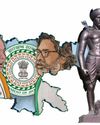China privileges its converging interests with Pakistan over benefits of warm ties with India.

Unlike Pakistan, readily identified as a bitterly hostile neighbour and ‘state sponsor of terrorism’, most Indians and the country’s leadership in particular, holds a more am bivalent opinion about China.
Significantly, though the much bandied about ‘all-weather’ Sino-Pak ties have usually worked to India’s detriment, leaders in New Delhi, who mercilessly castigate Pakistan, show much more restraint and caution in criticising China in public. Views critical of China are mostly limited to opinion pieces in the media or aired by retired government officials in TV debates. A statement from South Block against Beijing is a rarity. “Our relations with China are not in black and white; they are more in the gray,” affirms a senior Indian diplomat. His remarks are reflective of the differing assessment, born out of past experience and ground reality, the Indian leadership have about the two neighbours.
With Pakistan, successive generations of Indian leaders and diplomats have spent entire careers in pursuing policies in the hope of normalising and improving relations. Unfortunately, most have ended in failures, leading Delhi’s political establishment to resignedly conclude at times that ‘good neighbourly’ relations with Pakistan would remain elusive, especially as long as Islamabad opts for cross-border terror as the most effective tool in its engagement with India.
With China, however, India’s relations have mostly been layered, providing the two countries to look for areas of cooperation of mutual benefit, even as their differences on crucial issues remain. The best example is their disputed boundary that, even after nearly six decades, is still unresolved. But this has not intruded in the two nations’ cooperation in other areas, especially in trade and other economic fields and also at international and multilateral fora to further common interests.
Bu hikaye Outlook dergisinin February 27, 2017 sayısından alınmıştır.
Start your 7-day Magzter GOLD free trial to access thousands of curated premium stories, and 9,000+ magazines and newspapers.
Already a subscriber ? Giriş Yap
Bu hikaye Outlook dergisinin February 27, 2017 sayısından alınmıştır.
Start your 7-day Magzter GOLD free trial to access thousands of curated premium stories, and 9,000+ magazines and newspapers.
Already a subscriber? Giriş Yap

Trump's White House 'Waapsi'
Donald Trump's victory in the US presidential election may very well mean an end to democracy in the near future

IMT Ghaziabad hosted its Annual Convocation Ceremony for the Class of 2024
Shri Suresh Narayanan, Chairman Managing Director of Nestlé India Limited, congratulated and motivated graduates at IMT Ghaziabad's Convocation 2024

Identity and 'Infiltrators'
The Jharkhand Assembly election has emerged as a high-stakes political contest, with the battle for power intensifying between key players in the state.

Beyond Deadlines
Bibek Debroy could engage with even those who were not aligned with his politics or economics

Portraying Absence
Exhibits at a group art show in Kolkata examine existence in the absence

Of Rivers, Jungles and Mountains
In Adivasi poetry, everything breathes, everything is alive and nothing is inferior to humans

Hemant Versus Himanta
Himanta Biswa Sarma brings his hate bandwagon to Jharkhand to rattle Hemant Soren’s tribal identity politics

A Smouldering Wasteland
As Jharkhand goes to the polls, people living in and around Jharia coalfield have just one request for the administration—a life free from smoke, fear and danger for their children

Search for a Narrative
By demanding a separate Sarna Code for the tribals, Hemant Soren has offered the larger issue of tribal identity before the voters

The Historic Bonhomie
While the BJP Is trying to invoke the trope of Bangladeshi infiltrators”, the ground reality paints a different picture pertaining to the historical significance of Muslim-Adivasi camaraderie